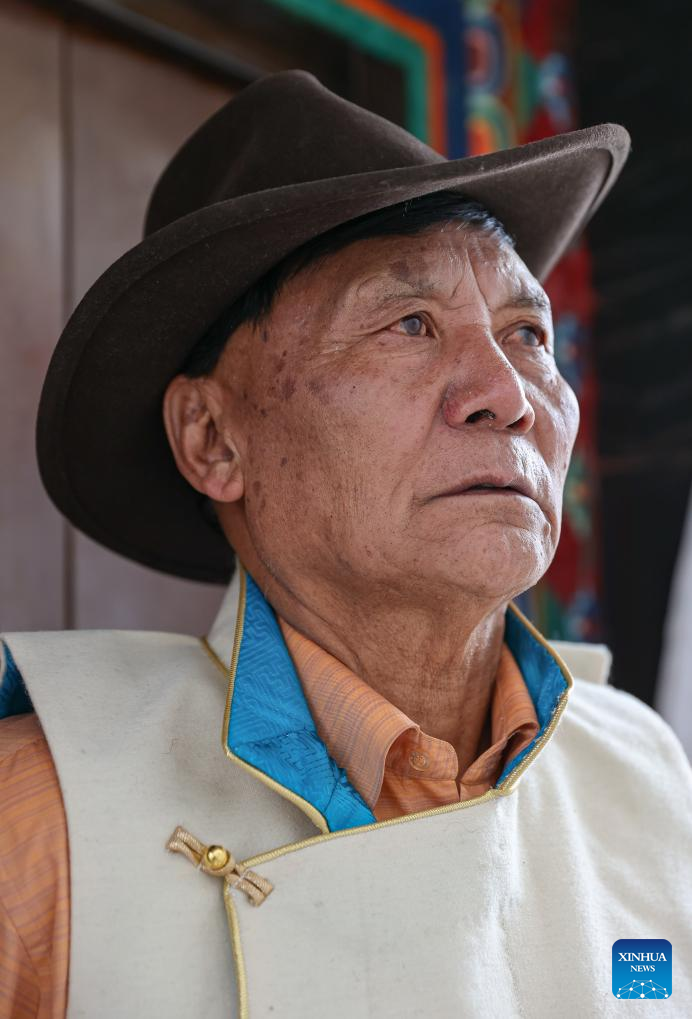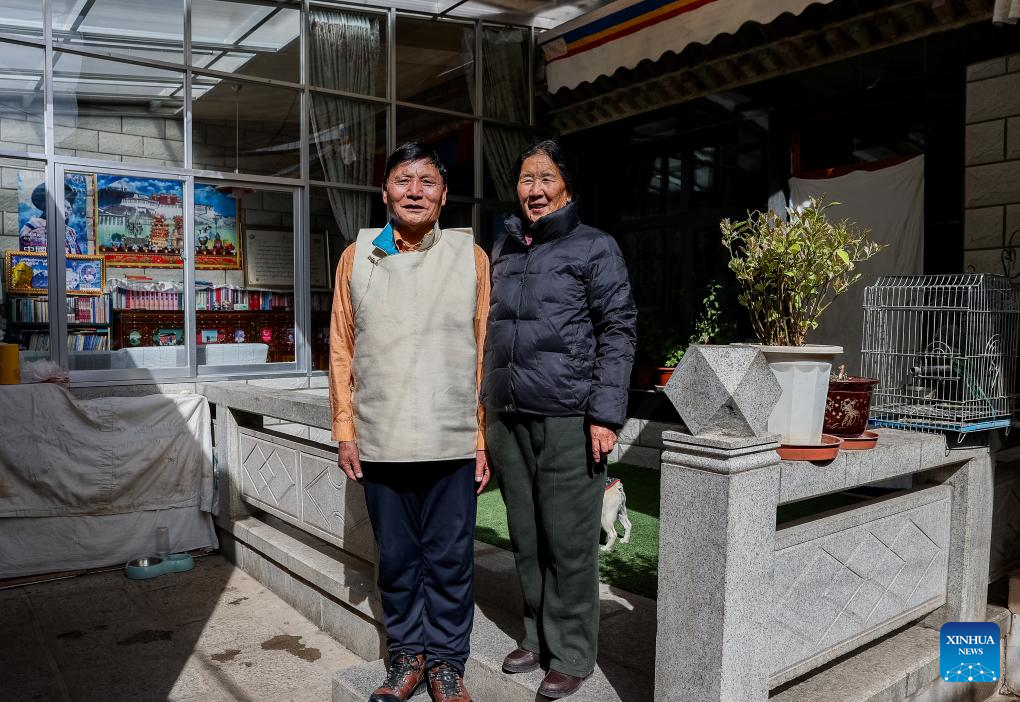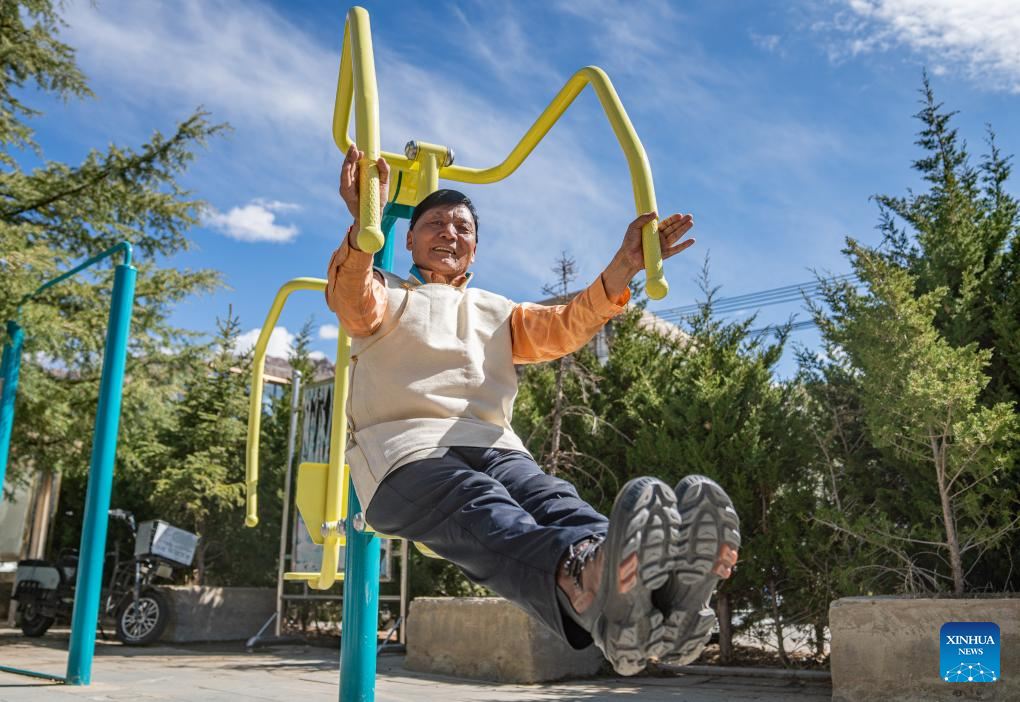
Phutsering pets a dog at home in Lhasa, southwest China's Xizang Autonomous Region, March 23, 2024. (Xinhua/Tenzin Nyida)
by Xinhua writers Liu Zhoupeng, Wei Guanyu and Bai Shaobo
LHASA, March 23 (Xinhua) -- Phutsering was born in 1944 into a serfs' family in Bainang County in the city of Xigaze, southwest China's Xizang Autonomous Region.
A humble shack, situated near the manor where his mother toiled as a serf, served as his childhood home. Meanwhile, his father, employed at a separate manor, struggled to make ends meet by farming and crafting during lean months, barely generating sufficient income to cover the rent and taxes for their dwelling and fields.
"Despite being born into serfdom, where our lives were as fragile as straw ropes, my parents offered me the best they had and instilled in me values of honesty and a thirst for knowledge. They were my guiding light through the darkest time, leading me towards the path of education," said the 79-year-old.
The gear of fate began to turn in 1956 when 12-year-old Phutsering undertook the duty of delivering letters between the People's Liberation Army (PLA) and a local thermal power station.
That same year, the PLA's arrival in Bainang provided him with a rare chance for education. He was sent to study in a primary school in Xigaze by the PLA.
The school offered a variety of subjects, such as Tibetan, Chinese, mathematics, and painting, using Tibetan textbooks, some of which were translated from Chinese editions.
At that time, education wasn't a priority for many serfs, as most of them preferred their children to learn skills like Thangka painting, which provided immediate income.
"The chance to learn was a true gift, significantly expanding my perspective," said Phutsering. "As a Tibetan proverb says, knowledge is more valuable than pearls and agates," he said.
In 1962, Phutsering attended a secondary school in Xigaze. Upon his graduation in 1965, he joined the publicity department in Xigaze, where he started working as a Tibetan-Chinese translator.
His monthly salary was 28 yuan (about 3.94 U.S. dollars). He would spend 5 yuan to buy gifts for his father, bringing him great joy.
Phutsering's thirst for knowledge never waned. In 1999, he studied English at the School of International Studies at Peking University for four months. Following his retirement in 2002, he furthered his education in computer skills at the regional bureau of veterans cadre in Lhasa in 2007.
To give back to society, Phutsering later served as a primary school teacher in Lhasa. He played a pivotal role in inspiring and helping numerous students to pursue education, including Karsa Drolma. As a result of his guidance, Karsa Drolma was accepted into a middle school in south China's Guangdong Province.
"There is a Tibetan proverb that goes, a young idler, an old beggar," said Phutsering. "I was once illiterate, but education changed my fate, and I know the importance of receiving education."
According to the regional government work report delivered in January this year, the educational subsidy including nutritious fees in Xizang has been raised to 5,620 yuan per student per year in 2024, benefiting 746,000 students.
"Students in Xizang enjoy much more favorable educational policies nowadays, so I often encourage them to study hard," said Phutsering.
On Serfs' Emancipation Day, which falls on March 28, Phutsering will work as a volunteer at the memorial hall marking the emancipation of more than 1 million serfs in Xizang in 1959.
This 2,700-square-meter exhibition hall displays statues reflecting the harsh duties and the tragic situation of serfs being imprisoned and abused in old Xizang.
Phutsering has taken part in this event since 2021 to tell visitors the dark history of old Xizang.
"While acknowledging the gravity of this historical era, we must keep its memory alive," he said, adding that "I feel a duty to tell the truths to more young people and tell them to value the present moment." ■

This photo taken on March 23, 2024 shows a portrait of Phutsering. (Xinhua/Ding Ting)

Phutsering and his wife pose for a photo at home in Lhasa, southwest China's Xizang Autonomous Region, March 23, 2024. (Xinhua/Ding Ting)

Phutsering exercises at his residential compound in Lhasa, southwest China's Xizang Autonomous Region, March 23, 2024. (Xinhua/Tenzin Nyida)



